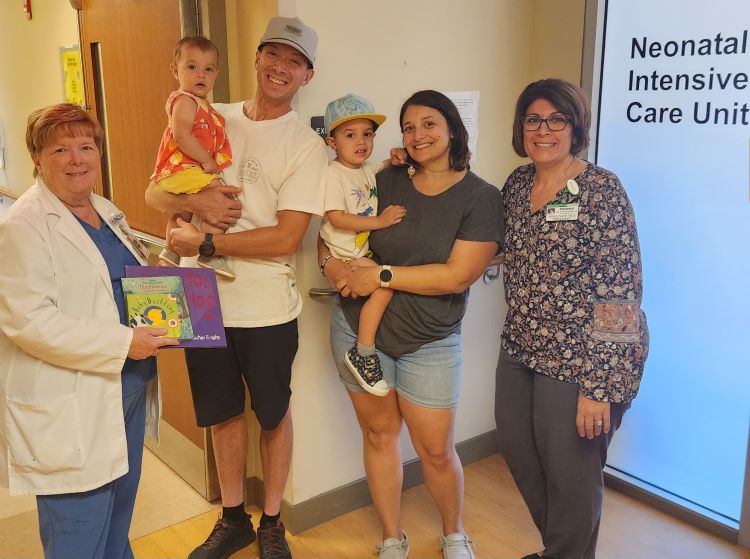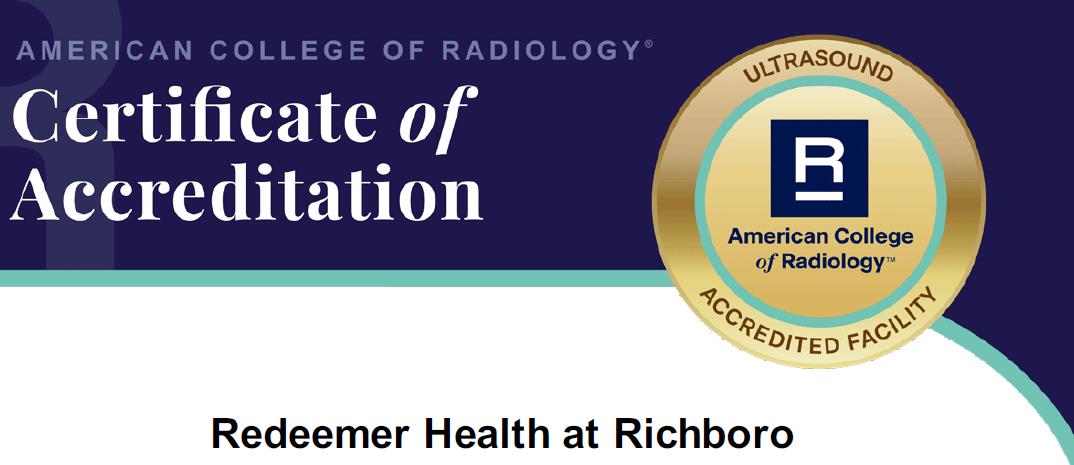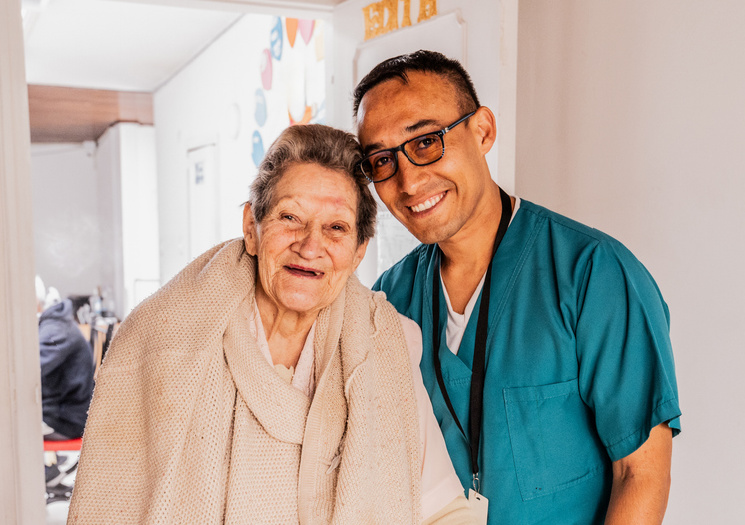- Find a Provider
-
Services
-
Redeemer Health provides compassionate care across every stage of life.
- View all Services
-
- Patients & Visitors
- Locations
- Careers
categories:

MEADOWBROOK, PA – OCTOBER 2024 – The Regional Coalition to Eliminate Race-Based Medicine announced this month that all its member health systems have transitioned away from race adjustments in clinical decision support tools that help guide lung, kidney, and OB-GYN care. Redeemer Health has participated in the coalition since early 2023.
"Outdated beliefs about biological differences between races have for many years been embedded in decision support tools used in the practice of medicine. The Regional Coalition is working aggressively to change these tools to make them race neutral. We are extremely appreciative of the health systems that have committed to eliminating these inappropriate race-based adjustments," said Dr. Seun Ross, coordinator of the Regional Coalition. "The work that each health system has done is already leading to improved outcomes in our region and over time will save and extend lives."
For example, the hospitals and health systems in the region adopted a change in the estimated Glomerular Filtration Rate or eGFR (the kidney function test) calculation that has helped over 721 patients move onto and up on the kidney transplant list. As a result, 63 of those patients received a kidney transplant during 2023.
The group has also advocated to remove race from the Kidney Donor Risk Index, a formula used by the Organ Procurement and Transplantation Network to assess donor kidney quality. These are the first milestones for the Regional Coalition, and it helps ensure that residents in the Philadelphia area are being assessed with the most appropriate and evidence-based clinical decision tools.
In addition to the kidney function test, the tools the Regional Coalition addressed and are now race-neutral, include spirometry (a lung function test), the vaginal birth after cesarean (VBAC) calculator, and race-based gestational anemia guidelines.
"Reducing disparity and inequity in health care is key to helping humans flourish as a people, which is the heart of our mission to care, comfort and heal," said Joshua M. Jenkins, Redeemer Health's Vice President of Mission Integration and Pastoral Care. "We are proud that our health care ministry contributes to this important work."
Click here to learn more about the Regional Coalition’s work.
categories:
MEADOWBROOK, PA – OCTOBER 2024 – Redeemer Health’s Home Health and Hospice operations headquartered in Egg Harbor and Elizabeth, New Jersey, are now owned and operated by BAYADA Home Health Care, a national, not-for-profit home health leader with a strong presence in New Jersey.
BAYADA will now serve Redeemer home health and hospice clients in those two New Jersey communities. The acquisition, which was approved by New Jersey regulatory bodies, allows BAYADA to combine the talented Redeemer Health workforce with BAYADA’s best- in-class operations, to continue to make a significant impact on the local communities.
Redeemer Health’s Home Care and Hospice South, headquartered in Runnemede, N.J., and Home Care and Hospice PA, were not part of this transaction. Also unaffected by the transaction are the food pantry and Healthy Families program, both located in Cape May, N.J.
BAYADA is headquartered in the Philadelphia region and provides nursing, rehabilitative, therapeutic, hospice and assistive care services to children, adults and seniors in the comfort of their homes.
categories:

By Ho Pak, MD, FACS, Director of Surgical Oncology, Surgical Oncologist, Thoracic Surgeon
Lung cancer is the top cause of cancer-related deaths and ranks as the second most common cancer affecting both men and women in the United States. According to the National Cancer Institute, an estimated 234,500 people in the U.S. will receive a lung cancer diagnosis in 2024. While tobacco smoking is the leading cause, more non-smokers, especially women, are getting lung cancer.
What Are the Risk Factors?
The main risk factors for developing lung cancer may include:
- Smoking tobacco (currently or in the past)
- Exposure to second-hand smoke
- Exposure to radon, asbestos, arsenic, chromium or other chemicals
- Living in an area with air pollution
- A family history of lung cancer infection with the human immunodeficiency virus (HIV)
- Radiation exposure, including radiation therapy to the breast or chest, and radon exposure. (Note: This is a minor risk factor and the benefits of radiation therapy as a cancer treatment far outweigh the risks.)
What Are Some of the Symptoms of Lung Cancer?
Lung cancer symptoms can vary from person to person. Many people with lung cancer may have no symptoms, but when symptoms are present, they may include:
- Cough that does not go away and gets worse over time
- Chest pain that is constant and often made worse by deep breathing, coughing or laughing
- Arm or shoulder pain
- Coughing up blood or rust-colored phlegm
- Shortness of breath, wheezing, or hoarseness
- Infections like pneumonia or bronchitis that do not go away or come back often
- Swelling of the neck and face
- Loss of appetite and/or weight loss
- Feeling weak or tired
Please remember, these symptoms may occur with other health conditions and are not only linked to lung cancer. If you notice any of these symptoms, it is important to talk with your family doctor about screening and diagnosis options.
Screening and Diagnosis
"Detecting lung cancer early can make treatment much more successful,” said Dr. Ho Pak, Director of Surgical Oncology, Surgical Oncologist and Thoracic Surgeon, with Redeemer Health in partnership with MD Anderson Cancer Center at Cooper.
Low-dose computed tomography (LDCT) scans are an effective tool for finding lung cancer early. The U.S. Preventive Services Task Force (USPSTF) recommends annual LDCT screening in adults aged 50 to 80 years who have a 20 pack-year smoking history and currently smoke or have quit within the past 15 years. If you meet these criteria and want to be screened, talk with your doctor about your options. Also check with your insurance provider to see what is covered.
Find Out More
To learn more about the lung cancer screening options available at Redeemer Health, visit redeemerhealth.org/lung-cancer-screening or call 215-938-LUNG (5864).
Experienced Care for Lung Cancer: Close to Home
The Redeemer Health in partnership with MD Anderson Cancer Center at Cooper lung cancer program maintains nationally recognized accreditation through the Care Continuum Center of Excellence by the GO2 Foundation for Lung Cancer and is recognized as a Screening Center of Excellence by the Lung Cancer Alliance. Click here to learn more.
About the Author: Dr. Ho Pak is a board-certified surgical oncologist and thoracic surgeon specializing in surgical treatment of cancers of the thyroid and parathyroid, lungs, esophagus, liver, stomach, pancreas and soft tissue, such as sarcoma and melanoma. Dr. Pak earned his medical degree from Temple University. He completed his surgical internship and residency at Abington Memorial Hospital, and he completed a fellowship in Surgical Oncology at the National Cancer Institute at the National Institutes of Health.
categories:

MEADOWBROOK, PA – OCTOBER 2024 — Little Flower Manor and St. Joseph Manor have been ranked among the top five skilled care facilities of their size in Pennsylvania in Newsweek's "Best Nursing Homes 2025" list.
To earn spots on this prestigious list, communities were evaluated by Newsweek's global research partner, Statista, on four critical pillars:
- Performance data from the Centers for Medicare & Medicaid Services
- Input from thousands of US health care experts gathered from an online survey
- Accreditations from the Joint Commission and the Commission on Accreditation of Rehabilitation Facilities
- Level of resident satisfaction derived from Google reviews
"This recognition serves as a testament to the unwavering dedication of our staff and the trust placed in us by our residents and their families," said Rosemary Port, RN, NHA, Vice President and Chief Administrative Officer at Little Flower Manor. "Being included in Newsweek's 'Best Nursing Homes 2025' list reflects our commitment to providing exceptional care and support to our residents," added D. Freeman, RN, BSN, NHA, PCA, Vice President & Administrator at St. Joseph Manor.
About Little Flower Manor and St. Joseph Manor
Little Flower Manor, located in Darby Township, PA, and St. Joseph Manor, located in Abington Township, PA, are Redeemer Senior Living communities offering short-term rehabilitation and long-term care services. They have received national recognition for quality care and service, earning Newsweek's "Best Nursing Home" distinction over several years and 5-star Medicare ratings. As members of the Redeemer Health family, both facilities benefit from the strength and resources of an integrated health care system that provides a full continuum of aging services supporting diverse lifestyles and needs—from active adult living to skilled nursing care.
Redeemer Health also encompasses a 239-bed acute care hospital, a physician network, outpatient services, a 31-bed transitional care unit, and home health and hospice services. For more information, visit redeemerseniorliving.org.
categories:

MEADOWBROOK, PA – SEPTEMBER 2024 — Pennsylvania Speaker of the House, Rep. Joanna McClinton (D-191), engaged Redeemer Health employees in discussion at Little Flower Manor, a skilled nursing facility in Darby, Pa.
The discussion included the Redeemer Health CEO, the Little Flower Manor executive director and board chair, and direct patient care employees. Two themes that surfaced in a dialogue about Pennsylvania’s challenges in long term care were staffing in a post-COVID job market, and Medicaid reimbursement shortfalls.
“It was an honor hosting Speaker McClinton,” said Redeemer Health CEO Greg Wozniak. “Her genuine concern and awareness of the challenges in long term care reflect her allegiance to the families in her district and across the Commonwealth.”
Speaker McClinton also toured Little Flower Manor, giving her the opportunity to talk with employees who provide direct patient care. “Meeting my neighbors who work on the front lines delivering patient care informs the policy development I do in Harrisburg,” said Speaker McClinton. “I appreciate the staff and administrators at Little Flower Manor for providing useful insight that made my tour extremely valuable.”
Improving the wellbeing and quality of life for residents in Delaware and Philadelphia counties are among Speaker McClinton’s top priorities, and that begins with their health, she explained. Speaker McClinton and House colleagues have fought tirelessly to advance initiatives that would help recruit more care providers and ensure the providers are adequately compensated for care they offer.
The 127-bed Little Flower Manor routinely scores the highest ratings in US News’ and Newsweek’s “Best Nursing Homes” editions. Originally founded in 1977, Little Flower Manor became part of the Redeemer Health system in 2017.
categories:

Breastfeeding has been shown to be one of the best things a mother can do to protect her baby’s health. Breast milk contains antibodies that help protect against infections and illnesses, reducing the risk of certain health conditions for both infants and mothers.
Some of the benefits for infants include reduced risk of respiratory infections, ear infections, and diarrhea. Breastfeeding has also been linked to a lower risk of sudden infant death syndrome (SIDS).
For mothers, breastfeeding can reduce the risk of breast and ovarian cancer, type 2 diabetes, and high blood pressure.
Breastfeeding triggers the release of hormones such as oxytocin and prolactin, which not only promote the production of breast milk but also contribute to stress reduction and relaxation for both mother and baby.
The Power of Together:
Breastfeeding in the early weeks can sometimes be a challenge for new moms, but the benefits are worth it! Getting help from your family, friends, babysitters, and others can make breastfeeding a smoother experience.
For example, your family can help by doing chores and watching older kids. Your health care provider can guide you to useful resources including breastfeeding support groups and online forums. And, if and when you return to work, your employer can assist by offering a private space for pumping or other flexible arrangements to make continued breastfeeding possible.
Additional Breastfeeding Support and Resources:
At Redeemer Health, our compassionate, knowledgeable lactation consultants will give you personalized support and guidance every step of the way.
Click here to read more about breastfeeding basics, including free lactation help resources, useful tips for partners and grandparents, and FAQs about getting started with breastfeeding.
We also offer a variety of breastfeeding resources and videos on our website and in our online community @redeemerbaby on Instagram and Facebook, where you can meet and stay connected with other new moms.
To learn more about our maternity care services and to download other useful educational materials about childbirth, breastfeeding, and after-delivery care, visit redeemerhealth.org/maternitycare.
categories:

A caring and generous donation benefiting our NICU families.
Krystal and Andrew Rigney from Croydon, Pa., had to bring their two little kids to the Holy Redeemer Hospital NICU last week.
This time, though, it was a happy occasion. Recalling their last visit in March 2021 when their son, Atlas, needed to spend a few days in an incubator, they returned to show their gratitude.
As a representative from PaperPie books, Krystal and her family donated a carton of children’s books for new parents to take home with their bundles of joy.
Both Atlas and his little sister, Rhea, were born at Holy Redeemer Hospital. “My husband and I had incredible experiences at Holy Redeemer Hospital for both of my deliveries,” Krystal said. “The doctors and nurses during my son’s stay in the NICU were amazing, and I can’t even begin to thank them for their kindness. They helped put our minds at ease when we were scared as first-time parents.”
The PaperPie books donated by the Rigneys will give new parents great stories to tell their babies, with ducklings, owls, bunnies, and even wombats.
“As a parent feeling completely ill-prepared for your baby’s stay in the NICU, I think having something to read helps comfort both you and your baby,” Krystal said.
Their visit was special for Atlas, who got to peek at tiny newborns in the incubators where he spent his first few days.
Thank you, Rigney family, for the fabulous and generous donation!
categories:

MEADOWBROOK, PA – AUGUST 2024 — Redeemer Health Richboro has been awarded a three-year accreditation in ultrasound after an extensive review by the American College of Radiology (ACR). This gold seal of accreditation represents the highest level of imaging quality and patient safety.
This accreditation allows the facility to perform general, gynecological and obstetrical ultrasound, as well as pediatric, vascular, peripheral venous and cerebrovascular.
Congratulations, Redeemer Health Richboro, for your outstanding achievement.
categories:

In the Philadelphia metropolitan area, nursing professionals are thriving, especially in skilled nursing facilities. The demand for skilled nursing care is high, providing consistent job opportunities for RNs, LPNs, and certified nursing assistants (CNAs). In fact, the Bureau of Labor Statistics highlights our region as fertile ground for nursing careers due to an aging population and increasing rates of chronic illnesses.
So Many Rewards in Skilled Nursing Care
While job stability in skilled nursing is unquestionable, working in skilled nursing facilities offers nursing professionals a unique set of rewards not commonly found in other health care environments.
In skilled nursing facilities, nurses collaborate in interdisciplinary teams to develop personalized care plans—which can last for several weeks to several years—for patients recuperating from surgeries, injuries, or acute illnesses. Skilled nursing professionals deliver precise and specialized care through these plans, witnessing the substantial progress patients make over time during their recovery journeys.
This extended duration of care not only fosters significant improvements for patients but also cultivates deeper connections between nursing professionals and patients. The emphasis on individualized care, measurable progress, and the opportunity for meaningful patient relationships sets skilled nursing apart as an attractive choice for many nursing professionals compared to hospital or outpatient settings.
“The Lafayette and St. Joseph Manor, which are Redeemer Health skilled nursing facilities, provide a level of personalized, holistic care that simply isn't possible in most hospital settings. Our nurses and CNAs have the opportunity to truly get to know each patient or resident, to understand their unique needs, goals, and life stories. This allows us to deliver care that is tailored to the individual, not just the illness or injury. Our nurses and CNAs are not just caregivers—they are mentors, advocates, and friends to those in their care,” says Patricia Benz, a skilled nursing talent recruiter for The Lafayette and St Joseph Manor.
The Lafayette and St. Joseph Manor: Supporting Nursing Professionals
Redeemer Health skilled nursing facilities, including The Lafayette and St. Joseph Manor, stand out as supportive environments for nursing professionals looking for fulfilling careers.
Through significant rate increases that honor the crucial role of skilled nursing professionals to fostering continuous learning through access to tuition assistance and nursing scholarship opportunities, Redeemer Health is committed to creating an environment that promotes professional growth.
Additionally, newly hired skilled nursing professionals value Redeemer Health’s Nurse Residency Program, which equips them with the necessary tools and mentorship for success in skilled nursing care. “In the Nurse Residency Program, nothing is ever the right or wrong question. You get to share your ideas. It makes me a better professional because I get to enhance what I’ve taken from the Nurse Residency Program and carry it on while I’m at work,” says Leashiea Reid, LPN, The Lafayette.
Explore Opportunities Now!
"There has never been a better time to join our rapidly expanding skilled nursing team at The Lafayette or St. Joseph Manor. We now offer increased rates and sign-on bonuses, plus with both facilities earning nationally recognized distinctions for short-term rehab and long-term care, now is the perfect time to be part of our journey towards excellence and seize exceptional opportunities for professional growth and personal fulfillment," says Patricia.
Redeemer Health welcomes you to consider RN, LPN, and CNA opportunities at The Lafayette and St. Joseph Manor. Click here to explore and apply for available jobs today.
